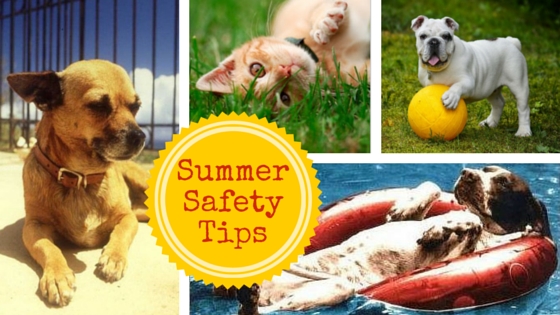No, you won’t find any kind of “Game of Thrones” spoiler in this month’s article…
Summer is a peculiar moment in comparison with the rest of the year: not only the warmest of the seasons, but also because lots of people (and their pets) are coming to our area within the following 3-4 months.
Here are some tips for preparing our pets for the summer:
Parrots and other companion birds: birds usually love direct sunlight and sunny days. Migratory birds are seen everywhere, and summer is the breeding season for most of them. It is relatively common if we have a female bird at home (without a male) that she may lay some eggs. Of course, the eggs will be sterile, no chick inside; but if the female has no nest available, or the quantity of eggs is big, we may have problems. There are different strategies in this case, but we should ask the Vet. Just removing the eggs is not a good option.
Rabbits and rodents: these animals are extremely sensitive to high temperatures, because they can’t sweat and are quite ineffective dissipating the remarkable corporal temperature their accelerated metabolism produces. They shouldn’t be exposed to sunlight if nobody is watching them (this is also valid for birds), specially from 11 to 18h. A hamster or rabbit may die of a heat stroke very easily in summer. Fresh water available all day round is not enough; they must also have a covered place for escaping from direct sunlight.
Cats: Cats love sunbathing and some of them even don’t care if they are nearly “incinerating” themselves. In case of white or poorly coated cats, summer sunlight must be totally avoided, since the odds of catching a very aggressive skin cancer are very high. It usually affects ears and eyelids and is lethal. Cats which suffer from chronic mouth problems normally have toothache, shouldn’t have cold food, because eating it is very painful for them, so they may start refusing the food. For this reason, if we keep cats wet food in the fridge, we should heat it up first.
Dogs: Dogs that swim daily (swimming pool or sea), may have the antiparasitic power of their collar or spot-on reduced or even eliminated, except in case we are using s 100% waterproof certified product. It takes about 4-5 days for a collar to launch its antiparasitic effect, since the insecticide must reach the whole skin surface. If our dog swims every day for 10-15 minutes, the insecticide disappears and we will need another 4-5 days for creating the barrier again. The solution in this case would be anti flea and tick tablets, but unfortunately they don’t cover mosquito. You can add some citronella spray for a full protection.
For all of them: When we buy a big bag of pet food (because the price per kilo is lower), we should store it in small and hermetic boxes in order to keep the freshness for much longer, and for avoiding the appearing of storage mites at the bottom of the bag, which are completely normal in every house, but they may produce allergic problems in humans and pets when eaten or inhaled.
We must make sure or pets vaccines are updated, specially in case of dogs, since infectious problems such as kennel cough are more common in summer due to air conditioned and more intense “social life”. Microchip details must be updated too, because the animal may get disorientated more easily in summer (more people, more traffic, more noise…). This updating, in case of RIVIA registered animals, can be done at home via internet, or by the Vet, and it’s a quick, easy and free procedure.
And finally, you must never leave the pet at the balcony or terrace under the sunlight all day round, or in a car not even 5 minutes. These two facts are forbidden by law.
Have a happy summer.
Liliana Aldeguer Cerdán col 793
English translation by Sergio Reina Esteban col 747



